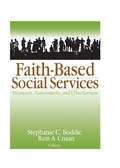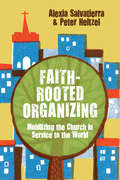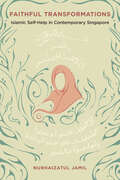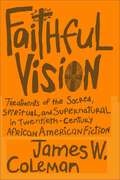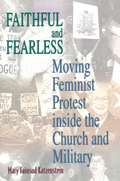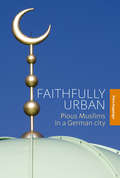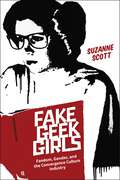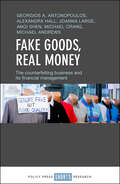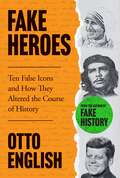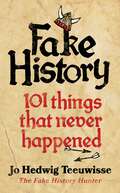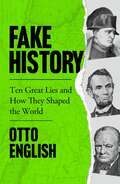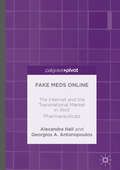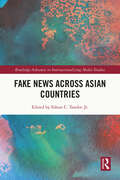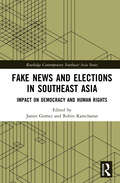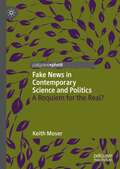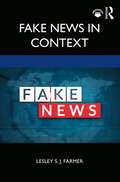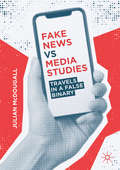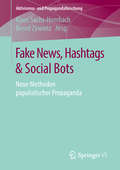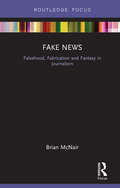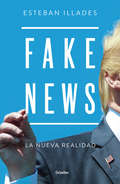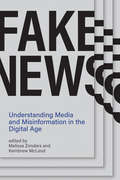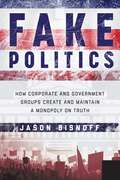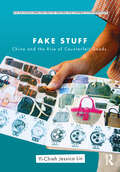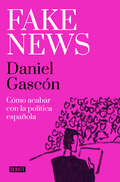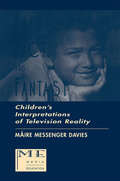- Table View
- List View
Faith-Based Social Services: Measures, Assessments, and Effectiveness
by Ram A. Cnaan Stephanie C. BoddieRead the latest studies on the effectiveness of religious-based services—and the problems revealed in the assessmentThe Charitable Choice provision and the Bush Administration’s National Faith-Based Initiative have broadened the scope of social services delivered through faith-based organizations. There are expectations that these faith-based social service providers will be more effective—but how should that effectiveness be measured? Faith-Based Social Services: Measures, Assessments, and Effectiveness explains the nature and quality of religion-based social service delivery while serving as a point of reference for future research and work. This unique source tackles the important, complex issue of measuring the effectiveness of faith-based social services in comparison to secular services while providing analysis of the latest available studies.Faith-Based Social Services: Measures, Assessments, and Effectiveness provides a conceptual analysis of FBOs (faith-based organizations) that reflects the need to gather detailed studies to assess social service effectiveness while reviewing the crucial issues challenging public policy. The latest empirical research is detailed, including the problems found when comparing secular and faith-based social service providers, their organizational structures, and the types of services offered. Analysis is included of the data from a three-state evaluation of welfare to work programs, a study of four types of faith-based services found in four cities, and an assessment of a church-based program for teenage drop-outs. Topics in Faith-Based Social Services: Measures, Assessments, and Effectiveness include: discussion on how social science research shunned faith-based services and how this neglect affected effectiveness problems inherent in efficacy assessment making funding priorities decisions the causes of outcome differences a model of evaluation based on randomized controlled clinical trials using measurement practices currently used by the nonprofit sector comparative case studies in transitional housing, parent education, and residential substance abuse treatment programs latest analysis of research involving faith-based organizations and the provided services’ efficacy much more! Faith-Based Social Services: Measures, Assessments, and Effectiveness is illuminating reading, perfect for social work professionals, students, educators, sociologists, religious leaders, and seminary educators.
Faith-Rooted Organizing: Mobilizing the Church in Service to the World
by Rev Alexia Salvatierra Peter HeltzelWith so many injustices, small and great, across the world and right at our doorstep, what are people of faith to do? Since the 1930s, organizing movements for social justice in the U.S. have largely been built on assumptions that are secular origin—such as reliance on self-interest and having a common enemy as a motivator for change. But what if Christians were to shape their organizing around the implications of the truth that God is real and Jesus is risen? Alexia Salvatierra has developed a model of social action that is rooted in the values and convictions born of faith. Together with theologian Peter Heltzel, this model of "faith-rooted organizing" offers a path to meaningful social change that takes seriously the command to love God and to love our neighbor as ourself.
Faithful Transformations: Islamic Self-Help in Contemporary Singapore (Dissident Feminisms)
by Nurhaizatul JamilMalay Muslim women in Singapore cultivate piety by attending popular Islamic self-help classes. Nurhaizatul Jamil’s ethnographic study offers an interdisciplinary analysis of this phenomenon. The Islamic self-help classes in this book exist at the nexus of sacred texts, aphorisms, and social media engagements, scaffolded by the neoliberal economy that shapes idealized Muslim subjectivities. Within a context whereby the Singapore state discursively frames Malayness in terms of cultural deficiency, Malay Muslim women’s inward focus on transformative ethics rather than societal change underscores the appeal of gendered pious self-help discourses. At the same time, Jamil’s referencing of Black, Indigenous, and Ethnic studies offers a compelling analytical frame that places affective transformation within the context of racial capitalism, historical trauma, and embodied healing. A provocative and rich ethnography, Faithful Transformations tells the stories of Malay Muslim women desiring piety and self-improvement as minoritized subjects in contemporary Singapore while exploring the limitations of self-care.
Faithful Vision: Treatments of the Sacred, Spiritual, and Supernatural in Twentieth-Century African American Fiction (Southern Literary Studies)
by James W. Coleman"This is a marvelous and sustained discussion of 'faithful vision' and its significant influence on African American literature." -- American LiteratureIn Faithful Vision, James W. Coleman places under his critical lens a wide array of African American novels written during the last half of the twentieth century. In doing so, he demonstrates that religious vision not only informs black literature but also serves as a foundation for black culture generally. The Judeo-Christian tradition, according to Coleman, is the primary component of the African American spiritual perspective, though its syncretism with voodoo/hoodoo -- a religion transported from West Africa through the West Indies and New Orleans to the rest of black America -- also figures largely. Reviewing novels written mainly since 1950 by writers including James Baldwin, Randall Kenan, Toni Morrison, John Edgar Wideman, Alice Walker, Gloria Naylor, Erna Brodber, and Ishmael Reed, among others, Coleman explores how black authors have addressed the relevance of faith, especially as it relates to an oppressive Christian tradition. He shows that their novels -- no matter how critical of the sacred or supernatural, or how skeptical the characters' viewpoints -- ultimately never reject the vision of faith. With its focus on religious experience and tradition and its wider discussion of history, philosophy, gender, and postmodernism, Faithful Vision brings a bold critical dimension to African American literary studies."An insightful interrogation of the complexities of religious discourse in the African American literary tradition. Because it superbly translates complex spiritual ethos into literary tradition, this remarkable book is a must for anyone interested in intersections of the sacred and the secular in black cultural productions." -- Southern Literary Journal"Faithful Vision both looks intently into faith and shows us how to look." -- Christianity and Literature
Faithful and Fearless: Moving Feminist Protest inside the Church and Military (Princeton Studies in American Politics: Historical, International, and Comparative Perspectives #188)
by Mary Fainsod KatzensteinRiots and demonstrations, the lifeblood of American social and political protest in the 1960s, are now largely a historical memory. But Mary Fainsod Katzenstein argues that protest has not disappeared--it has simply moved off the streets into the country's core institutions. As a result, conflicts over sexual harassment, affirmative action, and the rights of women, gays and lesbians, and people of color now touch us more than ever in our daily lives, whether we are among those seeking change or those threatened by its prospects. No one is more aware of this than women demanding change from within the United States military and the American Catholic church. Women in uniform are deeply patriotic and women active in the church are devoted to their callings. Yet Katzenstein shows that these women often feel isolated and demeaned, confronted by challenges as subtle as condescension and as blatant as career obstruction. Although faithful to their institutions, many have proved fearless in their attempts to reshape them. Drawing on interviews with over a hundred women in the military and the church--including senior officers, combat pilots, lay activists, and nuns--this book gives voice to the struggles and vision of these women as they have moved protest into the mainstream. Katzenstein shows why the military and the church, similarly hierarchical and insistent on obedience, have come to harbor deeply different forms of protest. She demonstrates that women in the military have turned to the courts and Congress, whereas feminists in the church have used "discursive" protests--writing, organizing workshops and conferences--to rethink in radical ways the meanings of faith and justice. These different strategies, she argues, reflect how the law regulates the military but leaves the church alone. Faithful and Fearless calls our attention to protest within institutions as a new stage in the history both of feminism and of social movements in America. The book is an inspiring account of strength in the face of adversity and a groundbreaking contribution to the study of American feminism, social protest, and the historical development of institutions in American society.
Faithfully Urban: Pious Muslims in a German City
by Petra KuppingerIn the southern German city of Stuttgart lives a pious Muslim population that has merged with the local population to create a meaningful shared existence. In this ethnographic account, the author introduces and examines the lives of ordinary residents, neighborhoods, and mosque communities to analyze moments and spaces where Muslims and non-Muslims engage with each other and accommodate their respective needs. These accounts show that even in the face of resentment and discrimination, this pious population has indeed become an integral part of the urban community.
Fake Geek Girls: Fandom, Gender, and the Convergence Culture Industry (Critical Cultural Communication #22)
by Suzanne ScottReveals the systematic marginalization of women within pop culture fan communitiesWhen Ghostbusters returned to the screen in 2016, some male fans of the original film boycotted the all-female adaptation of the cult classic, turning to Twitter to express their disapproval and making it clear that they considered the film’s “real” fans to be white, straight men. While extreme, these responses are far from unusual, with similar uproars around the female protagonists of the new Star Wars films to full-fledged geek culture wars and harassment campaigns, as exemplified by the #GamerGate controversy that began in 2014.Over the past decade, fan and geek culture has moved from the margins to the mainstream as fans have become tastemakers and promotional partners, with fan art transformed into official merchandise and fan fiction launching new franchises. But this shift has left some people behind. Suzanne Scott points to the ways in which the “men’s rights” movement and antifeminist pushback against “social justice warriors” connect to new mainstream fandom, where female casting in geek-nostalgia reboots is vilified and historically feminized forms of fan engagement—like cosplay and fan fiction—are treated as less worthy than male-dominant expressions of fandom like collection, possession, and cataloguing. While this gender bias harkens back to the origins of fandom itself, Fake Geek Girls contends that the current view of women in fandom as either inauthentic masqueraders or unwelcome interlopers has been tacitly endorsed by Hollywood franchises and the viewer demographics they selectively champion. It offers a view into the inner workings of how digital fan culture converges with old media and its biases in new and novel ways.
Fake Goods, Real Money: The Counterfeiting Business and its Financial Management
by Alexandra Hall Georgios A. AntonopoulosThe trade in counterfeit goods is growing and is increasingly linked to transnational organised crime. But little is known about the financial mechanisms that lie behind this trade. This is the first account of the financial management of the counterfeiting business. Written by experts in a wide range of fields, it examines the financial and business structures in relation to the illicit trade in counterfeit products. Based on interviews with active criminal entrepreneurs in the UK and abroad and other data, the authors explore ‘organised crime’ and mutating criminal markets, digital technologies and their criminological and sociological implications, and cultural values and practices. This book will make a significant contribution to our understanding of these timely issues.
Fake Heroes: Ten False Icons and How they Altered the Course of History
by Otto EnglishFrom the author of Fake History, Otto English, comes a shocking yet hilarious look at ten of the greatest liars from our past, examining these previously unquestioned idols and exposing what they were trying to hide.'A brilliant book.' James O'BrienWas Che Guevara really a revolutionary hero?Should Mother Teresa be honoured as a saint?Is Henry V actually England's greatest king?And why does JFK's legend continue to grow?Having exposed some of the greatest lies ever told in Fake History, journalist Otto English turns his attention to some of history's biggest (and most beloved) figures.Whether it's virtuous leaders in just wars, martyrs sacrificing all for a cause, or innovators changing the world for the better, down the centuries supposedly great men and women have risen to become household names, saints and heroes. But just how deserving are they of their reputations?Exploring everything from Captain Scott's reckless hunt for glory and Andy Warhol's flagrant thievery to Coco Chanel's murky Nazi past, Otto English dives into the hidden lives of some of history's most recognisable names. Scrutinising figures from the worlds of art, politics, business, religion and royalty, he brings to light the murkier truths they would rather have kept buried away, at the same time as celebrating the unsung heroes lost to time.Fake Heroes exposes the truth of the past and helps us understand why that matters today.
Fake History: 101 Things that Never Happened
by Jo Teeuwisse**An International Bestseller**Fake news about the past is fake history.Did Hugo Boss design the Nazi uniforms?Did medieval people think the world was flat?Did Napoleon shoot the nose off the Sphinx?*Spoiler Alert* The answer to all those questions is no.From the famous quote 'Let them eat cake' - mistakenly attributed to Marie Antoinette - to the apocryphal horns that adorned Viking helmets, fake history continues to shape the story we tell about who we are and how we got here. With doctored photographs, AI-generated images and false claims about the past circulating in the news and on social media, separating fact from fiction seems harder than ever before.Jo Hedwig Teeuwisse, better known as The Fake History Hunter, is on a one-woman mission to hunt down fake history and reclaim the truth for the rest of us.In this fascinating and illuminating book, Teeuwisse debunks 101 myths so you can correct your friends and family, and arm yourself with the tools to spot and debunk fake history wherever you encounter it.
Fake History: Ten Great Lies and How They Shaped the World
by Otto English'A brilliant and important book ... Five Stars!' Mark Dolan, talkRADIO'An important new book' Daily Express An alternative history of the world that exposes some of the biggest lies ever told and how they've been used over time.Lincoln did not believe all men were created equal.The Aztecs were not slaughtered by the Spanish Conquistadors.And Churchill was not the man that people love to remember.In this fascinating new book, journalist and author Otto English takes ten great lies from history and shows how our present continues to be manipulated by the fabrications of the past.He looks at how so much of what we take to be historical fact is, in fact, fiction. From the myths of WW2 to the adventures of Columbus, and from the self-serving legends of 'great men' to the origins of curry – fake history is everywhere and used ever more to impact our modern world.Setting out to redress the balance, English tears apart the lies propagated by politicians and think tanks, the grand narratives spun by populists and the media, the stories on your friend's Facebook feed and the tales you were told in childhood. And, in doing so, reclaims the truth from those who have perverted it.Fake History exposes everything you weren't told in school and why you weren't taught it.
Fake Meds Online
by Alexandra Hall Georgios A. AntonopoulosThis book provides a timely criminological investigation into the rapidly growing sale of fake medicines online. Some estimates suggest that the fake medicine trade has now overtaken marijuana and prostitution as the world's largest market for criminal traffickers. This increase has been particularly apparent in the context of various evolutionary phases in information and communications technologies, and the Internet now acts as the main avenue through which this criminal market is expanding. Thus far - despite growing concern and media attention - this extensive, extremely profitable, and ultimately life-threatening online market is yet to be fully explored. Drawing on the authors' own criminological investigation of both the supply and demand sides in the United Kingdom, this study offers the first in-depth and empirically-grounded analysis of the online trade in illicit medicines. Founded on rigorous research, and bolstering a rich area for debate, this book will be of particular interest for scholars of criminology and technology studies.
Fake News Across Asian Countries (Routledge Advances in Internationalizing Media Studies)
by Edson C. TandocThis book integrates insights from studies conducted across Asia to provide a comprehensive account of the fake news problem in the region.Emerging from a study on how Singapore stakeholders define, determine, and deal with online falsehoods, the volume expands to cover numerous Asian contexts, all of which have experienced the problem in not only similar but also unique ways, coupled with diverse cultures and media regulatory contexts. Drawing from specific examples and case studies to demonstrate the real-world manifestation of the concepts and theories on fake news, the book grounds academic research in lived experiences.This volume will interest journalism scholars and undergraduate and postgraduate students in the areas of media studies, mass communication, digital media, media literacy, Asian studies, and political communication.
Fake News and Elections in Southeast Asia: Impact on Democracy and Human Rights (Routledge Contemporary Southeast Asia Series)
by James Gomez and Robin RamcharanThis book offers a regional analysis of the impact of fake news – misinformation, malinformation and disinformation – on electoral democracy and freedom of expression in Southeast Asia, which has taken place in the middle of a global health pandemic. The book maps the impact of social media and the internet on democracy in the members of the Association of Southeast Asian Nations that have already been in the throes of democratic regression for some time. Including an analysis of countries that do not have national elections, the chapters provide detailed information on the extent of internet and social media penetration in each country, the laws that are deployed to reel in its political potential for critics and demonstrate the impact on democracy or the prospects for democracy. Collectively, contributors note that disinformation is a serious problem in the region that negatively impacts elections and how governments’ attempts to deal with the phenomenon inevitably lead to the targeting of dissenting voices and opposition as anti-state fake news. The deleterious impact on democracy and freedom of expression, facilitated by a citizenry that is prone to manipulation of facts, appears to be the standard modus operandi in the regional authoritarian complex. This book is the first to undertake a regional analysis of disinformation in Southeast Asia and is a significant contribution to the literature on democracy, elections and disinformation. It will be of interest to researchers in the fields of Political Science and Asian Politics, in particular Southeast Asian Politics.
Fake News in Contemporary Science and Politics: A Requiem for the Real?
by Keith MoserThis transdisciplinary book investigates the profound repercussions of living in a post-truth world in which 'alternative facts' and post-truth knowledge claims, often bordering on the absurd, have replaced the real in the collective imagination of millions of people around the planet. Through discussions on climate change denial, the anti-vaccination movement, the January 6th Insurrection and the Russia-Ukraine War, this study explores the gravity of the current 'infodemic,' or the increasing inability of a large segment of the population to distinguish between reality and misrepresentation, and the destabilizing impact this infodemic has on democratic models of governance around the globe, coinciding with the rise of autocratic forms of populism.
Fake News in Context
by Lesley S. FarmerFake News in Context defines fake news and sets it within a historical and international context. Helping readers to become more skilled at detecting misinformation, the book also demonstrates how such knowledge can be leveraged to facilitate more effective engagement in civic education. Distinguishing between fake news and other forms of misinformation, the book explains the complete communication cycle of fake news: how and why it is created, disseminated and accessed. The book then explains the physical and psychological reasons why people believe fake news. Providing generic methods for identifying fake news, Farmer also explains the use of fact- checking tools and automated algorithms. The book then details how various literacies, including news, media, visual, information, digital and data, offer unique concepts and skills that can help interpret fake news. Arguing that individuals and groups can respond and counter fake news, which leads to civic engagement and digital citizenship, the book concludes by providing strategies for instruction and tips for collaborating with librarians. Including a range of international examples, Fake News in Context will be of interest to teaching faculty, and students of library and information science, communication studies, media studies, politics and journalism. Librarians and information professionals will also find a valuable resource in this book.
Fake News vs Media Studies: Travels in a False Binary
by Julian McDougallThis book explores the place of Media Studies in the age of ‘fake news’, analysing the calls for a curriculum of critical news literacy as part of a cyclical policy debate. With the need for young people in democracies to understand mainstream news agendas and take a critical perspective on social media news, including so-called ‘fake news’, this book argues for Media Studies as a mandatory subject. However, ‘fake news’ is not presented in the book as a stable, neutral term with a clear definition, but is instead defined as an idea that risks obscuring the key critical and political premise of Media Studies. All media representation requires critical deconstruction: therefore, any distinction between ‘real’ and ‘fake’ media is a false binary. The author draws together two narrative strands: one analysing contemporary news and journalism, featuring interviews with journalists and news commentators, and the other re-appraising the discipline of Media Studies itself. This bold and innovative book will appeal to all those interested in the nebulous and often confusing media landscape, as well as students and practitioners of Media Studies.
Fake News, Hashtags & Social Bots: Neue Methoden populistischer Propaganda (Aktivismus- und Propagandaforschung)
by Klaus Sachs-Hombach Bernd ZywietzDer Band versammelt Beiträge zum Thema der gegenwärtigen „digitalen“ Propaganda, wie sie im Kontext des Populismus eine besondere Rolle spielt. Sie wird als politisch-mediales Phänomen analysiert und als gesellschaftlich-kommunikatives Herausforderung: dies hinsichtlich der Sorge vor der einseitigen Beeinflussung einer neuen, fragmentierten „Masse“ im Netz sowie um die für medienvermittelte Demokratien fundamentale Möglichkeit des vertrauensvollen Austausches von Informationen und Meinungen auf Basis diskursethischer Prinzipien.
Fake News: Falsehood, Fabrication and Fantasy in Journalism (Disruptions)
by Brian McNairFake News: Falsehood, fabrication and fantasy in journalism examines the causes and consequences of the ‘fake news’ phenomenon now sweeping the world’s media and political debates. Drawing on three decades of research and writing on journalism and news media, the author engages with the fake news phenomenon in accessible, insightful language designed to bring clarity and context to a complex and fast-moving debate. The author presents fake news not as a cultural issue in isolation but rather as arising from, and contributing to, significant political and social trends in twenty-first century societies. Chapters identify the factors which have laid the groundwork for fake news’ explosive appearance at this moment in our globalised public sphere. These include the rise of relativism and the crisis of objectivity, the role of digital media platforms in the production and consumption of news, and the growing drive to produce online content which attracts users and generates revenue.
Fake News: La nueva realidad
by Esteban IlladesEl mayor peligro del acceso ilimitado a la información es que siempre hay alguien que la acepta sin cuestionar. En la prensa escrita y en la digital, en las redes sociales y en los medios tradicionales, un torrente de mentiras, propaganda e inexactitudes -motivadas por el afán de dinero, notoriedad o poder- se mezcla y confunde con el reporte de hechos reales. Jamás ha sido tan fácil ser engañado: a la censura y el espionaje se han sumado la sobreinformación y las fake news. En este escenario, que parece sacado de una distopía orwelliana, la ética periodística, la confirmación y el rigor parecen reliquias olvidadas. El fenómeno es poderosísimo y ya define el rumbo del mundo: en buena parte gracias a la difusión de «noticias» falsas, Donald Trump ganó la Presidencia de Estados Unidos. Y no es un fenómeno ajeno. En México, las fake news son pan de todos los días, como lo demostró el «caso Frida Sofía». Ya jugaron un papel clave en la elección de 2012 y sin duda serán protagonistas este 2018. En este libro, el periodista Esteban Illades examina decenas de casos en los que la confusión y la falsedad han llevado a resultados catastróficos, y explora las razones de que -en plena Era del Conocimiento- sigamos creyendo datos imposibles y, por el contrario, negando evidencias irrefutables.
Fake News: Understanding Media and Misinformation in the Digital Age (Information Policy)
by Kembrew McLeod Melissa ZimdarsNew perspectives on the misinformation ecosystem that is the production and circulation of fake news.What is fake news? Is it an item on Breitbart, an article in The Onion, an outright falsehood disseminated via Russian bot, or a catchphrase used by a politician to discredit a story he doesn't like? This book examines the real fake news: the constant flow of purposefully crafted, sensational, emotionally charged, misleading or totally fabricated information that mimics the form of mainstream news. Rather than viewing fake news through a single lens, the book maps the various kinds of misinformation through several different disciplinary perspectives, taking into account the overlapping contexts of politics, technology, and journalism.The contributors consider topics including fake news as “disorganized” propaganda; folkloric falsehood in the “Pizzagate” conspiracy; native advertising as counterfeit news; the limitations of regulatory reform and technological solutionism; Reddit's enabling of fake news; the psychological mechanisms by which people make sense of information; and the evolution of fake news in America. A section on media hoaxes and satire features an oral history of and an interview with prankster-activists the Yes Men, famous for parodies that reveal hidden truths. Finally, contributors consider possible solutions to the complex problem of fake news—ways to mitigate its spread, to teach students to find factually accurate information, and to go beyond fact-checking.ContributorsMark Andrejevic, Benjamin Burroughs, Nicholas Bowman, Mark Brewin, Elizabeth Cohen, Colin Doty, Dan Faltesek, Johan Farkas, Cherian George, Tarleton Gillespie, Dawn R. Gilpin, Gina Giotta, Theodore Glasser, Amanda Ann Klein, Paul Levinson, Adrienne Massanari, Sophia A. McClennen, Kembrew McLeod, Panagiotis Takis Metaxas, Paul Mihailidis, Benjamin Peters, Whitney Phillips, Victor Pickard, Danielle Polage, Stephanie Ricker Schulte, Leslie-Jean Thornton, Anita Varma, Claire Wardle, Melissa Zimdars, Sheng Zou
Fake Politics: How Corporate and Government Groups Create and Maintain a Monopoly on Truth
by Jason BisnoffIn “grassroots” campaigns, the grass isn’t always green—or natural.In today’s chaotic world, where the multiplication of information sources creates competing narratives, credibility is the key to winning the war of ideas. This is the reason why governments and corporations resort to astroturfing—creation of ostensibly grassroots movements set up to advance political agendas and commercial campaigns. The democratization of information and polarization of politics offer a perfect storm.Fake Politics tells the stories of how this practice has transformed political activism into a veiled lobbying effort by the rich and the powerful. Through a series of vignettes involving the tea party, oil industry, big tobacco, big data, and news media, this book will explore the similarities and differences between various campaigns that appeared as grassroots but, in reality, were lobbying efforts fueled by governments, corporations, major industries, and religious institutions.The process, named for the artificial grass fields at football stadiums and high schools across the country, became so prevalent in the last two decades that it now sits at a tipping point. In the era of “fake news” and “alternative facts,” with the truth well on its way to becoming indistinguishable from fabrication, what can the past of astroturfing tell us about the future of grassroots activism?
Fake Stuff: China and the Rise of Counterfeit Goods (Routledge Series for Creative Teaching and Learning in Anthropology)
by Yi-Chieh Jessica Lin"The Anthropology of Stuff" is part of a new Series dedicated to innovative, unconventional ways to connect undergraduate students and their lived concerns about our social world to the power of social science ideas and evidence. Our goal with the project is to help spark social science imaginations and in doing so, new avenues for meaningful thought and action. Each "Stuff" title is a short (100 page) "mini text" illuminating for students the network of people and activities that create their material world. Yi-Chieh Lin reveals how the entrepreneurial energy of emerging markets, such as China, includes the opportunity to profit from fake stuff, that is counterfeit goods that rely on our fascination with brand names. Students will discover how the names and logos embroidered and printed on their own clothes carry their own price tag above and beyond the use value of the products themselves. The book provides a wonderful introduction for students to global markets and their role in determining how they function.
Fake news: Cómo acabar con la política española
by Daniel GascónUna antología de artículos y viñetas esencial para acabar,de una vez por todas, con la política española. «Gascón, lúcido analista de la política española.»Javier Cercas, El País La Ley Gascón consta de un único artículo y una apostilla, a saber: «Toda sátira es profecía. Toda parodia es eufemismo». Es posible que esto sea cierto en todas las épocas, pero una de las características de la conversación pública actual es el ciclo informativo de veinticuatro horas y siete días a la semana, que va muy deprisa y que a la vez no se dirige a ninguna parte. No solo se confunden lo urgente y lo importante, también se mezclan lo real y el simulacro. En los últimos cinco años España ha vivido un golpe de Estado posmoderno, cuyos protagonistas todavía no saben si iba en serio o no; una moción de censura contra un presidente del Gobierno que decidió emborracharse mientras lo echaban, y de la que salió un nuevo presidente apoyado por los que habían protagonizado un pronunciamiento civil unos meses antes; el primer Gobierno de coalición, con el sostén de un partido que se oponía a la casta y que consiguió colocar a un matrimonio en el Consejo de Ministros; el ascenso y hundimiento de un partido de centro liberal y el surgimiento de una fuerza de ultraderecha. Mientras, científicos sociales explicaron lo que es el sesgo y luego lo ejemplificaron con su comportamiento. Enfrentado a tamaño panorama, Daniel Gascón habla de temas que le importan a través de formas que le gustan, con el humor como lente fundamental y la viñeta como ilustración certera. Fake news es una especie de crónica de hechos alternativos, así como un extraño intento de diagnóstico. Porque, como la realidad se empeña en recordarnos cadadía, toda sátira es profecía y toda parodia es eufemismo. De Un hípster en la España vacía se dijo:«Libro con aires de parodia, entretenido hasta decir basta, irreverente sin hacer sangre, sobre un varón urbano, paladín de la Nueva Masculinidad, sabihondo, dogmático, ridículo, que se instala en un pueblo de Teruel con el noble fin de dar lecciones de modernidad a los lugareños.»Fernando Aramburu «La principal virtud de esta novela es aquello que, en este país donde goza de tanto prestigio la solemnidad pomposa y palabrera, muchos considerarán su peor flaqueza: su humildad, su falta absoluta de pretensiones. Gascón, lúcido analista de la política española, pergeña un retrato demoledor y exactísimo, además de hilarante, de la realidad de nuestro país; también un retrato compasivo: al fin y al cabo, el hipster del título no es más que un tonto entrañable, que es casi lo máximo que se puede aspirar a ser en esta vida.»Javier Cercas, El País Semanal «Los contrastes saturadísimos de estas páginas tienen una gracia de cartoon adulto contagiosa. El conjunto es irreverente, sí, pero más amable que cruel, a condición de que el lector sepa reírse de sí mismo o de su padre cuando llegue el momento de verse reflejados/deformados en algún rasgo.»Nadal Suau, El Cultural
Fake, Fact, and Fantasy: Children's Interpretations of Television Reality (Routledge Communication Series)
by Maire Messenger DaviesBased on a study examining the meaning of the term "media literacy" in children, this volume concentrates on audiovisual narratives of television and film and their effects. It closely examines children's concepts of real and unreal and how they learn to make distinctions between the two. It also explores the idea that children are protected from the harmful effects of violence on television by the knowledge that what they see is not real. This volume is unique in its use of children's own words to explore their awareness of the submerged conventions of television genres, of their functions and effects, of their relationship to the real world, and of how this awareness varies with age and other factors. Based on detailed questionnaire data and conversations with 6 to 11-year-old children, carried out with the support of a fellowship at the Annenberg School for Communication, University of Pennsylvania, the book eloquently demonstrates how children use their knowledge of real life, of literature, and of art, in intelligently evaluating the relationship between television's formats, and the real world in which they live.
